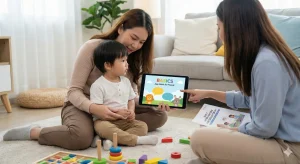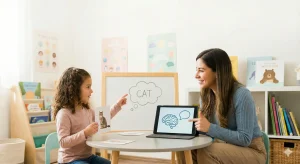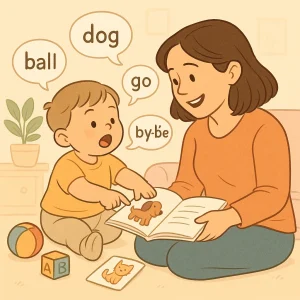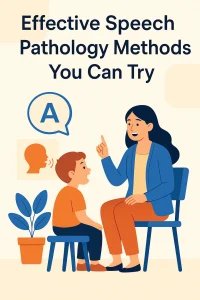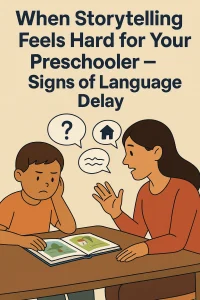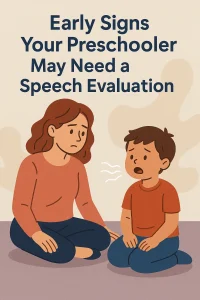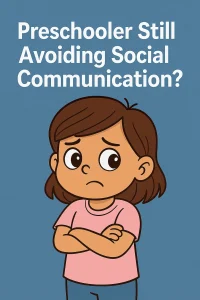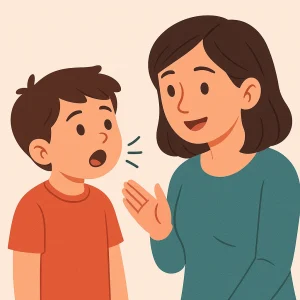10 Easy Tips to Help Your Baby Start Talking
Last Updated: July 31, 2024
Watching your baby start to communicate is one of the most exciting milestones of early parenthood. You might find yourself eagerly waiting for that first “Mama” or “Dada,” and it’s natural to want to help your little one along the way. Developing language skills is crucial for your baby’s overall growth, impacting their social skills, cognitive development, and emotional well-being.
In this article, we will share practical, easy-to-follow tips to help your baby start talking. These methods are designed to fit seamlessly into your daily routines, making it easy for you to support your baby’s language development naturally and effectively. Whether you are feeding, playing, or just spending time together, there are numerous ways to encourage your baby’s first words and beyond.
Early Communication (0 to 6 Months)
Help Your Baby Start Talking
During the first six months, your baby is like a sponge, soaking up everything around them. One of the best ways to help your baby start talking is by holding them close and talking to them frequently. Babies are naturally drawn to faces and will respond to your expressions and voice.
Chat About Daily Activities
As you go about your day, take the time to chat with your baby. While feeding, changing, or bathing, describe what you’re doing. For example, you might say, “Now we’re putting on your clean diaper” or “Look, we’re pouring warm water for your bath.” This constant exposure to language helps your baby start associating words with actions and objects.
Sing to Your Baby
Singing is another excellent way to help your baby tune into the rhythm of language. Simple lullabies or nursery rhymes are great choices. Singing not only soothes your baby but also introduces them to the melody and flow of speech.
Assist Baby in Talking
Repeat Sounds
When your baby makes cooing or babbling sounds, repeat them back. This interaction teaches your baby valuable lessons about listening and taking turns in conversations. For instance, if your baby says “goo,” you can respond with “goo-goo.” This playful mimicry encourages your baby to keep experimenting with sounds.
Use a Sing-Song Voice
Babies are naturally attracted to higher-pitched, sing-song voices. Using this type of voice helps keep your baby’s attention and makes it easier for them to pick up on the nuances of language. For example, when you say, “Who’s a happy baby?” in a melodic tone, it grabs their interest and engages them more effectively.
Milestones of Baby Speech Development
| Age Range | Milestone Description | Example Milestones |
|---|---|---|
| 0-6 Months | Cooing, gurgling, and babbling | – Makes cooing sounds – Gurgles when happy – Starts to babble with sounds like “ba-ba” or “da-da” |
| 6-12 Months | Responds to name, says simple words | – Turns head when name is called – Understands “no” – Says “mama” or “dada” – Imitates sounds and gestures |
| 12-18 Months | Uses simple words, begins to combine words | – Uses simple words like “milk,” “up,” “more” – Begins to combine two words like “more juice” – Points to objects when named |
| 18-24 Months | Vocabulary grows, starts forming simple sentences | – Vocabulary increases to about 50 words or more – Starts forming simple sentences like “I want cookie” – Names body parts and common objects |
Also read: Speech and Language Milestones: 0 to 12 Months
Building Vocabulary (6 to 12 Months)
Baby Talking Tips and Encouragement
As your baby approaches the 6 to 12-month mark, their ability to understand and begin to form words takes a significant leap. This period is crucial for building their vocabulary and encouraging early speech. Here are some effective baby talking tips to help your little one start talking more.
Name and Point to Objects
One simple yet powerful way to encourage your baby to talk is by naming and pointing to objects you see together. For example, say, “Look, a cat,” while pointing to a cat. Gradually add more details as they get older, like “Look, a black cat with a long tail.” This practice helps your baby associate words with objects and actions.
Know more about on Teach Your Toddler Name Recognition with Easy Home Activities
Look at Books Together
Spend time looking at books with your baby. You don’t have to read the words on the pages; instead, discuss the pictures. For example, point to a picture of a dog and say, “What sound does a dog make? Woof woof!” This helps your baby practice speech sounds and understand that words represent real-world objects and actions.
Encourage Baby to Talk
Limit the Use of Dummies
To encourage more talking, limit the use of dummies to sleep times only. It’s hard for babies to learn to talk with a dummy in their mouth. By reducing dummy use during the day, you create more opportunities for your baby to babble and experiment with sounds.
Play Interactive Games
Interactive games like “peek-a-boo” and “round and round the garden” are fantastic for teaching turn-taking and attention skills. These games also introduce your baby to the back-and-forth nature of conversations. For example, when you play “peek-a-boo,” say “Where’s the baby? There you are!” This interaction keeps them engaged and encourages them to respond with sounds or words.
By incorporating these tips into your daily routine, you can help build your baby’s vocabulary in a fun and interactive way. Remember, the key is to make these activities part of your regular interactions, so they become natural and enjoyable for both you and your baby.
Encouraging Speech (12 to 18 Months)
Effective Tips to Help Your Baby Start Talking
As your baby grows into a toddler, their ability to communicate improves dramatically. Between 12 to 18 months, it’s essential to encourage speech development in a supportive and engaging way. Here are some effective tips to help your baby start talking during this crucial stage.
Gently Correct by Repeating Words Properly
When your child attempts to say a word but doesn’t get it quite right, gently correct them by repeating the word properly. For instance, if they point to a cat and say “Ca!”, respond positively with “Yes, it’s a cat.” This approach reinforces the correct word without making your child feel criticized.
Increase Vocabulary by Offering Choices
Another way to expand your child’s vocabulary is by offering them choices. For example, ask, “Do you want an apple or a banana?” This not only teaches them new words but also gives them the opportunity to practice making decisions and expressing their preferences.
Interactive Games and Benefits
| Game | Description | Benefits |
|---|---|---|
| Peek-a-Boo | Cover and uncover your face while saying “Peek-a-boo!” | – Teaches turn-taking – Enhances attention span |
| Round and Round the Garden | Circle your fingers on baby’s palm, ending with a tickle | – Enhances vocabulary – Introduces fun interaction |
| Pat-a-Cake | Clap hands together while reciting the rhyme | – Builds memory – Promotes speech development |
| Row, Row, Row Your Boat | Sit facing your baby, hold hands, and rock back and forth while singing the song | – Encourages physical movement – Enhances language skills |
Read more about on Understanding Toddler Speech: Speech Milestones at 18 Months
How to Encourage Your Baby to Start Talking
Use Toys and Books That Make Noise
Incorporate toys and books that make noise into your daily routine. These can be excellent tools for developing your child’s listening skills. Toys that produce sounds when pressed or shaken, and books with built-in sound effects, can captivate your child’s interest and encourage them to mimic the sounds they hear.
Enjoy Singing Nursery Rhymes with Actions
Singing nursery rhymes with your child is a fun and effective way to enhance their memory and speech development. Choose songs that include actions, like “Pat-a-cake,” “Row, Row, Row Your Boat,” and “The Wheels on the Bus.” Performing the actions while singing helps your child remember the words and associate them with movements, making the learning process more interactive and enjoyable.
Enhancing Communication (18 to 24 Months)
As your child grows from 18 to 24 months, their ability to understand and use language blossoms. This period is perfect for enhancing communication through simple yet effective practices.
Repeat Words and Use Simple Instructions
One of the best ways to aid your child’s understanding is by repeating words and using simple instructions. For example, you can say, “Get your coat,” when preparing to go outside. This helps your child learn to follow directions and associate words with actions. Consistency and clarity are key, so keep your instructions short and straightforward.
Ask “Where’s Your…” Questions
Encourage your child to learn the names of body parts by asking questions like, “Where’s your nose?” or “Where’s your ear?” This playful approach not only teaches them new words but also engages them in a fun and interactive way. It helps them understand and remember the names of different body parts through repetition and positive reinforcement.
How Can I Help My Baby Start Talking?
Limit TV Time and Encourage Play
One of the most effective tips for baby speech development is to limit screen time and encourage active play. Excessive TV watching can reduce the time your child spends interacting with you and practicing their language skills. Instead, engage in storytelling, reading, and imaginative play, which are far more beneficial for language development.
Enhance Language Skills Through Storytelling
Storytelling is a powerful tool for enhancing your child’s language skills. Make it a daily habit to read books together, telling stories that capture their imagination. Ask questions about the story, such as, “What do you think happens next?” or “Why is the cat sad?” This not only improves their vocabulary but also encourages critical thinking and comprehension.
Developing Sentences (2 to 3 Years)
Promote Baby Talking and Baby Communication Skills
Between the ages of 2 and 3 years, your child will start forming simple sentences. This is an exciting time to promote baby talking and develop their communication skills further.
Help Build Sentences
When your child begins to use short phrases, help them build sentences by extending their words. For example, if your child says “sock off,” you can respond with, “Yes, we’re taking your sock off.” This technique not only validates their attempt to communicate but also teaches them how to construct more complex sentences.
Get Their Attention
Always start by calling your child’s name to get their attention before speaking. This ensures they are focused on you and are ready to listen. For instance, say, “Emily, do you want to play with your toys?” Then, give them ample time to respond, which encourages active participation in the conversation.
Learn more about Prewriting Skills in Children: Foundations of Writing
Teach Words That Go Together
Introduce your child to words that go together by showing them related objects. For example, you can show them a ball, a teddy, and a rattle while saying, “These are toys.” This helps your child learn to categorize objects and understand how words relate to each other.
Minimize Background Noise
To help your child focus on your voice and improve their listening skills, minimize background noise from the TV and radio. When the environment is quieter, your child can better concentrate on the words you are saying, enhancing their ability to learn and communicate.
Additional Tips
As you continue to help your baby start talking, there are a few more simple methods to promote baby talking and strategies to boost your baby’s language skills that you can incorporate into your daily routine.
Talk About Your Daily Activities
One of the easiest ways to provide constant language exposure is to talk about your daily activities. Whether you’re cleaning, shopping, or cooking, narrate what you’re doing. For example, while cooking, you can say, “Now we are washing the vegetables,” or during shopping, “Let’s pick some apples.” This ongoing commentary helps your baby learn new words and understand how language is used in everyday life.
Use Symbolic Sounds with Meaning
Incorporate symbolic sounds like “whoops” or “uh-oh” into your conversations. These sounds are easy for babies to mimic and can be associated with actions or pictures, making them fun and educational. For example, if you accidentally drop something, say “whoops!” or “uh-oh,” and show a surprised expression. This not only teaches your baby about cause and effect but also adds a playful element to learning language
Addressing Concerns
It’s natural for parents to worry about their child’s speech development. If you’re concerned about your baby’s progress, it’s important to seek professional advice. Consulting a GP or health visitor can provide reassurance and, if necessary, they can refer you to a speech and language therapist for further assessment and support. Understanding baby speech milestones can help you track your child’s progress and identify areas where they might need additional help.
Baby Speech Milestones and Tips
For parents looking for baby speech tips, it’s helpful to know what to expect at different stages. By 12 months, most babies will start to say simple words like “mama” or “dada.” By 18 months, they may have a vocabulary of around 20 words, and by the age of 2, they often begin combining two words to form simple sentences like “want juice.” Keep in mind that every child is unique, and some may develop these skills earlier or later than others.
Supporting Bilingual Children
If your child is growing up in a bilingual household, speaking to them in the language you’re most comfortable with is key. Children adapt well to learning multiple languages, and this can be a significant advantage in their cognitive development. For instance, one parent can speak to the child in one language, while the other parent uses another. This consistent exposure helps them become proficient in both languages without confusion.
Conclusion
Engaging with your baby to support their language development is one of the most rewarding aspects of early parenthood. By talking, singing, and playing with your baby, you create a rich language environment that encourages them to start talking and develop their communication skills. Remember, every child progresses at their own pace, so be patient and enjoy the journey of discovering new words and expressions together.
As you continue to support your baby’s speech development, make the most of these precious moments. Celebrate their achievements, no matter how small, and remain positive and encouraging. The process of learning to talk is not just about the end goal but also about the bonding and fun you share along the way.
Frequently Asked Questions:
1: How can I help my baby start talking?
Engage with your baby regularly by talking, singing, and playing. Narrate your daily activities, read books together, and encourage them to mimic sounds and words. These practices create a rich language environment that promotes speech development.
2: What are some effective tips to help my baby start talking?
Some effective tips include talking to your baby often, repeating the sounds they make, using a sing-song voice, playing interactive games, and reading books together. Limiting the use of dummies during awake times also encourages more vocal interaction.
3: How can I encourage my baby to talk more?
Encourage your baby to talk more by offering choices, such as asking if they want an apple or a banana, and responding positively to their attempts at speech. Use simple instructions and ask questions like, “Where’s your nose?” to help them learn new words.
4: What should I do if I’m worried about my child’s speech development?
If you have concerns about your child’s speech development, consult your GP or health visitor. They can refer you to a speech and language therapist if necessary. Monitoring baby speech milestones can also help you track their progress.
5: Are there simple methods to promote baby talking at home?
Yes, simple methods include talking about your daily activities, using symbolic sounds like “whoops” or “uh-oh,” and minimizing background noise to help your baby focus on your voice. Singing nursery rhymes with actions also helps promote speech development.
6: How can I support my bilingual child’s language development?
Speak to your bilingual child in the language you are most comfortable with. Consistent exposure to both languages will help them learn and adapt. Encourage them by using both languages in daily interactions and activities.
7: What are some strategies to boost my baby’s language skills?
Strategies include reading books together, playing interactive games, repeating words, using simple instructions, and offering choices to increase vocabulary. Ensuring a quiet environment can also help your baby focus on learning new words.
8: How do interactive games help in baby speech development?
Interactive games like “peek-a-boo” and “round and round the garden” teach turn-taking, attention skills, and the back-and-forth nature of conversations. These games make learning fun and engaging for your baby, promoting better speech development.
9: How do symbolic sounds help my baby learn to talk?
Symbolic sounds like “whoops” or “uh-oh” are simple and fun for babies to mimic. Associating these sounds with actions or pictures helps your baby understand cause and effect, making learning more engaging and interactive.
10: What role does reading play in my baby’s speech development?
Reading to your baby introduces them to new words and sounds, helps them understand that words represent real-world objects and actions, and improves their listening skills. Discussing pictures in books, even if you’re not reading the words, enhances their vocabulary and comprehension.
About the Author:
Anuradha Karanam
Speech-language pathologist (7+ years of experience)
Anuradha Karanam is a skilled speech-language pathologist with over 6 years of experience. Fluent in Tamil, Telugu, Hindi, and English, she specializes in parent counseling, speech sound disorders, fluency assessment, and speech-language evaluations. Anuradha excels at working with children with developmental disorders, offering creative and effective therapy programs. Currently, at Wellness Hub, she holds a BASLP degree and is registered with the RCI (CRR No A85500). Her patience, ambition, and dedication make her a trusted expert in her field.
Book your Free Consultation Today
Parent/Caregiver Info:
Client’s Details:
* Error Message
